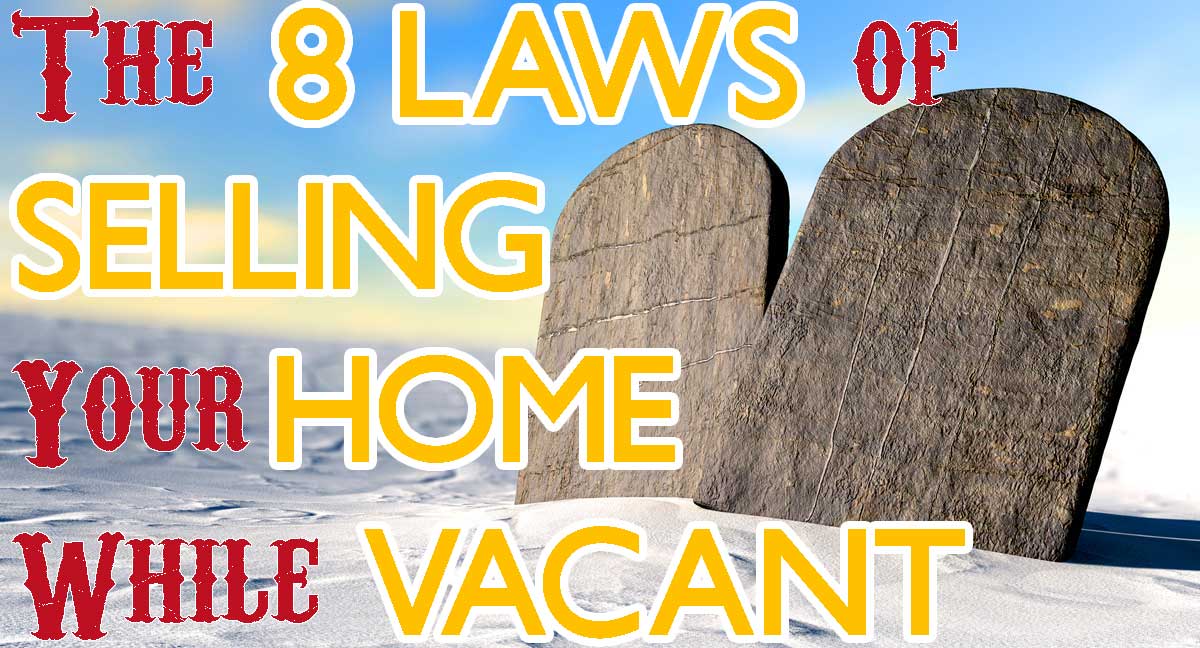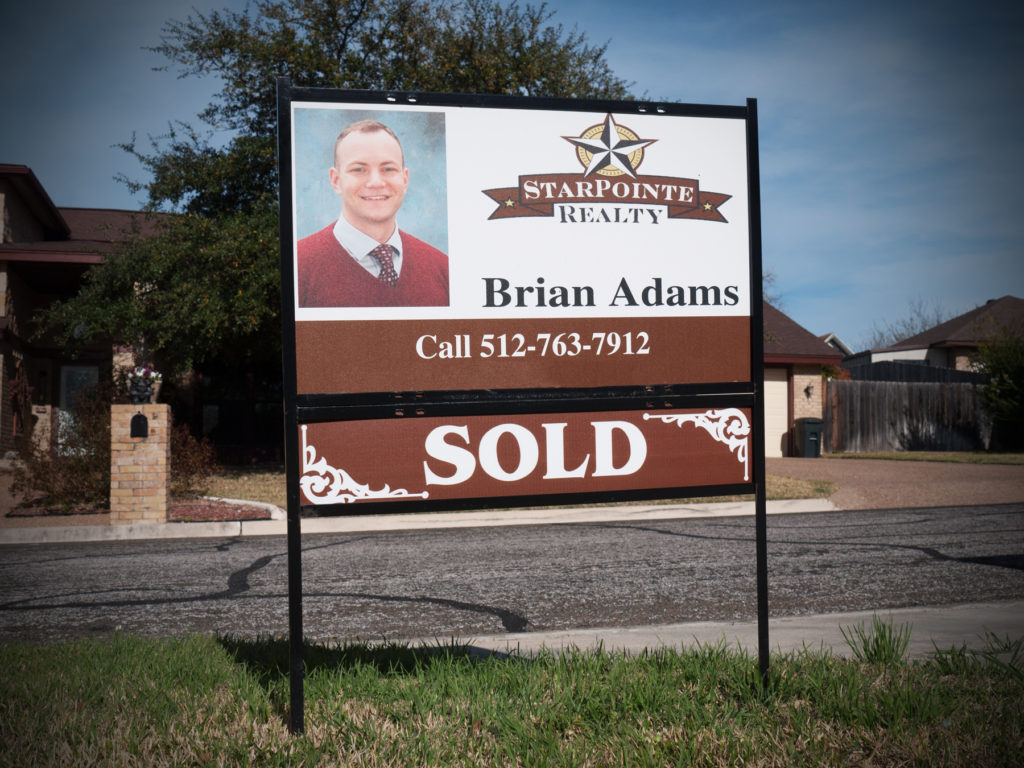 Takeaways
Takeaways
- Sell your home vacant when possible
- Doing these things is not just about convenience to you, but keeping your home presentable and sold
- Utilities is the #1 problem I run into as an agent – keep the utilities on!
So a couple months ago we looked at rules when selling your home while still living in it. Now for a different ball game – selling your home while vacant.
Selling your home while vacant is probably the preferred method of selling your home. An unscientific study I conducted actually found that owner-occupied homes sold for the highest price per square foot, strangely enough. But they also were less likely to sell at all. This surprising finding I suspect was due to the motivation level of owner occupants versus vacant home owners who are more serious about selling.
- Nearly Half of Fort Hood Homes For Sale Don’t Sell
- Selling Your House Vacant? That’ll Cost You $8756.27 in the Fort Hood Area
Following these rules are all about my PACE Home Selling Strategy, with elements of Accessibility (lock boxes), Exposure (yard signs and great pictures) and Condition (great first impressions). Doing each of these is not a suggestion. It’s a law. Do it if you want your home to sell at all, let alone for the full fair market value.
Keep the A/C On
And the utilities – electric, gas and water.
You are selling your home. Selling. Sales. What is the #1 Rule of Sales? Sell feelings, not “things”. You literally want your buyer to feel good about your product.
In this case, the product is your house. And the “feeling” you’re selling is “being cool indoors on a fire hot Texas summer day”. Trust me – it makes a huge difference. The house before yours may not have had the A/C on, and the buyer comes in sweating through their shirts to view your home and – amazing! – cool, pleasant tranquility! Who cares about the rest of your home, the buyer is literally just glad to be there. They’ll linger longer, take it all in, and just get a better all around vibe.
Utilities are not just about the A/C. Having the electricity on so buyers can turn on lights as needed to see rooms or the garage is a tremendous benefit. Having the water on means your buyers can…ahem…if the need arises after four hours of looking at homes (and heaven forbid if the water is NOT on but they realize too late…).
I realize it’s more expensive to keep the utilities on than to not, but A) you have to turn them on anyway once you’re under contract (it’s in the contract) and B) the couple hundred bucks to keep it on while on the market is a cheap price to pay for the value added to your buyers’ experience and increasing the odds they make an offer.
Keep the Yard Mowed
You and your agent will want to schedule a mowing just before your home gets its photography done and hits the market, so that it is ready 100%. During the growing season, you’ll want to keep the lawn cared for at least every two weeks. In winter, you can get away with skipping this step, but if still on the market come spring, be sure to remember to get someone out there.
You can do this yourself if you are still in the area. But if not, or if easier, hire a recommended lawncare company.
Keep the Pool Clean
Don’t let your pool go to slop, either. A pristine pool is a great selling feature, worth $10,000+ depending on the home and pool. Unattended for even a short while and they look many times less appealing. You want buyers to take one look at your pool and start weighing the pros and cons of stripping to their boxer briefs and jumping right in, there and then. A pool full of leaves, writhing June bugs and blown around garbage ain’t gonna cut it.
Worse, a pool unattended for too long may get expensive to clean. If it starts to go green, you are approaching the point at which it has to be emptied, cleaned, and refilled. $1000s. Not to mention possible problems with the equipment.
Also, you want to keep your pool full of water, regularly topped off. Not only is this for appearances, but a dry pool is susceptible to damage. Resurfacing a pool can cost $10,000+. That is more than the pool is even worth to your home’s value. If you have the little skimmer-cleaner-rolly-thingy, then you’re probably good on the cleaning bit. But you will still need someone to come out regularly to add chemicals and water. If you hire a regular pool company (every two weeks), that should be sufficient.
As a safety/liability note, also be sure that any fence repairs are completed immediately if owning a pool. You don’t need unwanted guests sneaking into your vacant home’s yard and injuring themselves or worse in your pool.
Use a Professional Cleaning Service
“I can clean it just fine myself”. Sometimes this is true. I have found usually it is not. You are moving. You have too much to think about and do to worry about spending a whole weekend properly cleaning. Just bite the bullet and pay $250 for a cleaning service. A professional carpet cleaning is even cheaper.
Many sellers I’ve worked with insist they can do it themselves. The end result is almost always shoddy compared to the squeaky and shiny product a professional cleaning service can deliver. A dirty home shows up in the pictures. It shows up in the home’s smell. It shows up during a buyer’s first impression, opening the door.
Saturdays everywhere are being wasted by sellers cleaning their own home. Save a Saturday. Hire a professional cleaning service.
Keep your Property Insurance
You probably will have active property insurance on your home already, especially if you still owe a mortgage (the lender requires it). However, if for any reason you don’t – get some! The simple truth is that vacant homes are at higher risk of property damage because there is not an owner or resident there daily to take care of minor issues and monitor the property, put out a fire, etc.
The entire process of selling your home is almost surely going to take a couple of months, even in a white hot market. That is a long time for something to go wrong. Don’t take that chance. Check out our list of recommended property insurance companies.
Get a Home Warranty
Also called a residential service contract, these are like a second insurance policy that covers what your regular property insurance doesn’t. For example, the fridge, appliances, HVAC, and many accidents like a plumbing leak. I represented a buyer on a home that we had under contract. The seller had waited six months to find a buyer. A week before closing, the sink somehow started leaking – and boy did it leak! All the way across the kitchen, into the dining room and pooling against the wall. It could have easily meant the end of the deal.
The listing agent was wise beyond his years and had the seller get a home warranty. A $50 or so service charge later and it was completely fixed. We closed a week later.
Not only is it good for accidents, but if the buyer’s inspector reveals items that are wrong with the home (which will happen), sometimes a home warranty can cover the item and keep the seller’s costs low and the buyer happy.
Home warranties are usually $50-$75 a month depending on the type and extent of coverage. A recommended home warranty company can have you covered in no time at all.
Use a Lockbox and Yard Sign
The lock box your agent uses should be the local board. For the Fort Hood Area MLS, it is the Supra brand lock box – a long blue box that fastens to the door handle. Agents can use an app on their phone to access the box during showings to get a key. It logs online every time the box is accessed.
This is better than a combo box (a traditional combo code lock box, like your luggage) for two reasons: accountability and feedback. If something goes amiss in your home, we can access the showing history to view which agents were there last, and when. That information will help us track down any issues.
I’ve never had to research the access history for a security related issue. But I do use it to find out who has shown our property and hunt them down for feedback. Getting good, prompt feedback from agents and buyers is important to make any adjustments to the property to get it sold. The small stain in the ceiling you hoped no one would care about? They do care. Or the pet odors that the Glade plugin was supposed to solve – ain’t workin’. These are things we need to know quickly in order to correct and get your home sold for the most. The lock box helps us do that.
Some sellers are nervous about yard signs because they view it as a “hey, this house is probably vacant and vulnerable” sign. I have not yet had any issues of trespassing or vandalism with my listings, however this is not an unfounded concern. That is what having sensible protections like insurance, home warranties, and lock boxes will go a long way to protect the home. The yard sign is absolutely necessary because it A) helps agents and buyers find your home and B) you would be shocked how many buyers I get calls from on a yard sign. It is still a great marketing tool that should be employed to get your home maximum exposure.
Also a note on security. It is not good for the buyer’s “chi” if the alarm is going off the entire time they are viewing your home. Keeping an alarm active is not a bad idea for a vacant home, and I wouldn’t try to dissuade someone from doing it. But be sure agents showing the property have the code. Apart from including it on the MLS, it might be a good idea to include the code on the key ring in the lock box, so that an agent is prepared to disarm (and rearm) the alarm for a showing.
Unplug and Open the Refrigerator
You don’t want or need your refrigerator running while vacant. It is a huge energy suck. So unplug it.
More importantly, you don’t want your refrigerator getting moldy and smelly inside while left unused. After unplugging it, leave all the refrigerator/freezer doors open, so that air can get through. I try to remember that when I am viewing a vacant home with the buyer. It is instinct to close the refrigerator doors, but gotta do the opposite if I see an unplugged and closed fridge.
Conclusion
Selling your home unoccupied is a lot easier than occupied. Most of these items either need to be done once, or can be outsourced on a schedule. That’s a lot easier than scrambling to clean for every last minute showing.
Following these rules will ensure A) your home gets sold and B) is as little a hassle to you as possible.

